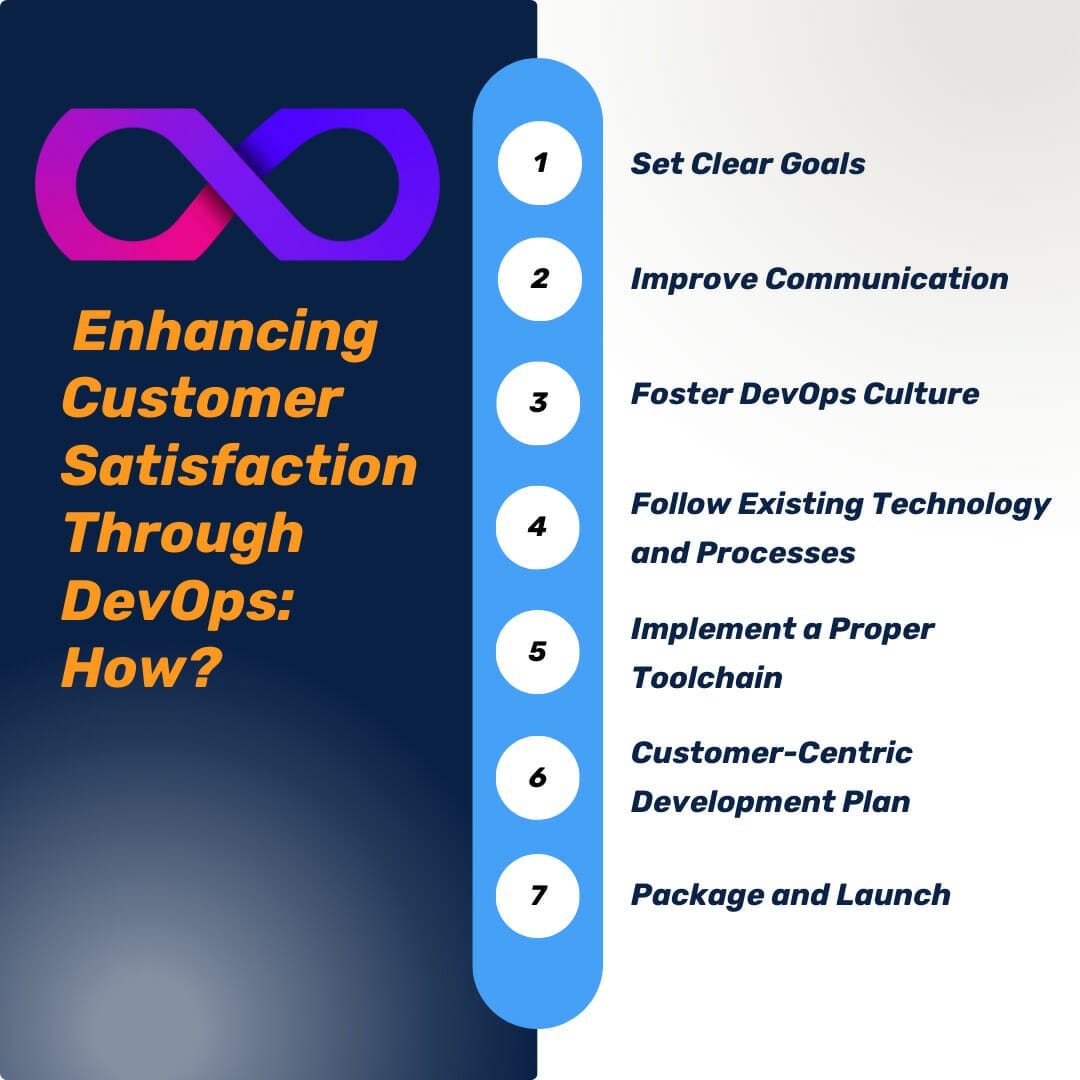In today’s competitive business landscape, delivering a seamless and exceptional customer experience is crucial. Every customer expects nothing less than seamless, user-centric services across all digital platforms. Such customer expectations have driven businesses to change how they develop, deploy, and manage their software applications and systems.
DevOps has gained significant attraction in the field of IT and business. It combines development and operations with a set of practices or an approach. DevOps is a cultural shift emphasizing collaboration, automation, and continuous improvement.
While it’s commonly associated with speeding up software delivery and improving operational efficiency. DevOps has the potential to reshape the customer experience landscape, offering organizations a powerful means to meet and exceed customer expectations like never before.
In this blog, we will discover how DevOps can be a power player in enhancing customer experience. We will delve into some of the major aspects that help DevOps to deliver an impactful customer experience.
DevOps practices are an impactful tool and approach for augmenting the customer experience in many ways. Through the cultivation of collaboration, automation, and continuous enhancement within development and operations teams, DevOps aids organizations in attaining heightened levels of agility, efficiency, and customer-centricity.
Allow me to elucidate the precise mechanisms through which DevOps practices can, directly and indirectly, improve the customer experience.
Here is a list of how DevOps practices improve customer experience
One of the biggest benefits of incorporating DevOps is expediting the delivery process. When it comes to deploying changes to customers, relevancy and time efficiency are of utmost importance.
With DevOps, a company offering DevOps services can adhere to a well-defined schedule due to the efficient streamlining of deliveries and automation of tasks. As a result, customers are well-informed about the nature and timing of each update, as logging occurs frequently and with precision.
DevOps strongly focuses on integrating automated testing and quality assurance practices across the entire development process. The strategic approach reduces the occurrence of bugs, glitches, and potential issues that end-users may encounter, ultimately resulting in a more streamlined and satisfactory user experience.
DevOps promotes enhanced collaboration amongst teams, resulting in expedited identification and resolution of problems. To maintain an efficient customer experience, engaging with customers across various channels is essential.
This facilitates the delivery of a consistent experience across the channels, ensuring responses are provided promptly. Whether it pertains to pre-sales inquiries or post-sale support, the faster resolution of customer issues is important.
Continuous monitoring and feedback loops are vital in DevOps, empowering organizations to effectively collect user feedback, address issues, and implement timely improvements. The proactive approach guarantees that the product aligns with the continuous demands of customers.
DevOps practices enable organizations to effectively scale their infrastructure and applications, guaranteeing the ability to facilitate increasing demand while maintaining optimal performance and user experience.
One of the advantages of implementing DevOps practices is the automation of security testing tools and approaches to improve the system’s overall security. These include testing static code analysis, dynamic application security testing (DAST), and vulnerability scanning techniques.
A wide pool of tools conducts ongoing evaluations of the codebase and infrastructure to identify potential security vulnerabilities. Any detected issues are relevantly addressed to maintain the security and resilience of our customer-facing systems.
It is crucial to prioritize customer satisfaction when creating plans for software as a service and similar projects. Ensuring that your customers’ needs and expectations are fulfilled at each and every stage of their journey, from initial consideration to final purchase, is important.
Collecting insights and feedback from your development and systems administration teams, you can draw hypothetical customer experience simulations that help refine and improve your offerings. This customer-centric approach is vital in meeting the growing demands of your users.
DevOps entails a perpetual process of planning, coding, testing, and deployment for software development. The iterative process allows for implementing new features and updates, often driven by customer feedback and real-world applications. Organizations can quickly serve evolving customer needs and preferences by continuously introducing enhancements.
One of the key benefits of improved communication within a DevOps environment is the ability to resolve issues faster. When developers and operations teams are in smooth and constant communication, they can quickly identify and address any issues that arise during the development or deployment processes.
Enhanced communication between teams leads to a reduction in the number of disruptions experienced by customers. By promoting a culture of collaboration and information sharing, DevOps can align their efforts and work towards a common goal.
By implementing DevOps practices, organizations can significantly reduce the chances of systems failures and downtime, resulting in improved availability and uninterrupted access to their offerings for customers. Automation plays a crucial role in achieving this objective.
With automation, repetitive and error-prone tasks can be streamlined and executed consistently, reducing the human error that often leads to system failures. By automating processes such as software deployment, configuration management, and infrastructure provisioning, organizations can ensure that these critical tasks are delivered accurately and efficiently, minimizing the risk of downtime.
DevOps practices are important in creating and maintaining stable environments, focusing on collaboration, automation, and continuous improvement. The organizations can minimize unexpected disruptions and ensure a consistent and reliable customer experience. The stability translates to consistent and reliable customer experiences, enhancing their satisfaction and trust in the organization’s products and services.
With the implementation of DevOps, the testing process becomes more efficient and simplified, resulting in a seamless identification and resolution of issues before they adversely affect customers. DevOps eliminates the silos that often exist between development and operations, fostering better collaboration and communication.
Acceleration of the testing process is observed, as smaller, incremental changes are easier to test and debug than large, monolithic changes. CI/CD pipelines can help teams test each iteration, enabling them to identify and fix any issues faster.
DevOps methodology enables optimizing the resource in the most efficient way. Organizations can ensure they are using their resources efficiently by closely monitoring and managing resources such as servers, storage, and networking. This can lead to cost savings as underutilized resources can be identified and reallocated.
The resulting cost savings can be reinvested in improving the customer experience, ultimately benefiting the organization and its customers.

Implementing DevOps practices to enhance customer experience involves seven key steps. Here’s a guide on how to do it:
To start with the journey of augmenting customer experience through DevOps, it is important to establish precise and quantifiable objectives. Deliberate on the particular improvements you aim to accomplish, be it expediting release cycles, mitigating downtime, or improving product quality. These goals will function as a navigational path throughout the course of implementation.
Effective communication is essential for the success of DevOps. It is crucial to eliminate any kind of barriers between development and operation teams by promoting a culture of open and transparent communication. By implementing effective collaboration, stakeholders can fully comprehend their individual responsibilities in delivering an exceptional customer experience.
DevOps encompasses more than just tools and processes; it represents a profound cultural transformation. Establish a mindset prioritizing improvements, adaptability, and unwavering focus on customer requirements. Focus on the significance of collective responsibility and ownership over the complete product lifecycle, from ideation to execution.
Utilize your current technology and processes as a solid basis for embracing DevOps. Assess the areas that require enhancement while acknowledging the presence of already efficient systems. DevOps emphasizes gradual progress rather than abrupt change but capitalizes on successful aspects.
When aiming to streamline your operations and achieve your objectives, it is important to carefully select and integrate the most appropriate DevOps tools and technologies. These tools play a drastic role in achieving automation, collaboration, and enhancing visibility across your development and operations teams.
Among the pool of tools available, some commonly employed ones are version control systems, CI/CD pipelines, configuration management, and monitoring solutions.
To create a full-fledged development plan, it is important to place the customer at the core. A thorough understanding of their challenges, tendencies, and inputs is crucial. Integrating what users say and their feedback into development cycles is extremely important. You must prioritize features and enhancements based on their potential to improve the customer experience and yield desired outcomes greatly.
To ensure a seamless deployment of your enhancements, it is important to package them effectively. Teams must prioritize smooth and well-coordinated releases to reduce any disruptions experienced by customers. Employing automation to reliably and consistently deploy updates is highly recommended, as it significantly reduces the risk of downtime.
Shortlist undertook a transformative journey guided by Mindbowser’s DevOps practices to evaluate the customer experience in the constantly evolving talent recruitment landscape. Our primary objective was to revolutionize how businesses engage with outstanding talent, while concurrently streamlining the hiring process to advantage employers and candidates alike.
One of the primary challenges that we have recognized is the requirement for a more streamlined and accurate method of aligning candidates with job opportunities. The conventional recruitment processes frequently lacked the flexibility and data-oriented perspectives for making decisive hiring decisions. This deficiency in the customer experience has motivated us to pursue inventive and cutting-edge solutions actively.
DevOps has served as our guiding principle throughout our transformative journey. We have embraced our internal processes but also to deliver an unparalleled experience to our esteemed customers.
DevOps entails a culture around perpetual enhancement. We consistently fine-tuned our algorithms and scoring models, guaranteeing the process became increasingly precise, personalized, and aligned with the distinctive requirements of our valued customers. This iterative approach resulted in progressively enhanced and gratifying customer experiences.
By implementing streamlined processes and automated systems, businesses can expedite their hiring processes, enabling them to make prompt decisions. This benefits the candidates by providing timely responses and enhancing the overall experience while simultaneously reducing uncertainty.

Mindbowser specializes in setting up the DevOps infrastructure that aligns perfectly with your customer’s unique needs. Our industry experts have a deep understanding of your organization’s existing development workflows and IT operational practices, enabling us to conduct a thorough analysis.
This analysis is the foundation for our DevOps services, enabling us to develop a meticulous plan that empowers your organization to embrace a DevOps strategy seamlessly.
At the onset of our collaboration, we thoroughly examined your current workflows and practices to establish a profound comprehension. Our team of seasoned professionals conducts an all-encompassing analysis of your existing processes, tools, and cultural dynamics to identify areas of enhancement and optimization.
We provide expert guidance to assist your organization in adopting DevOps practices, resulting in streamlined operations and enhanced customer engagement and services.
In DevOps, customer value is extensive and impactful. It includes:
DevOps aims to deliver quality, reliable, secure, and personalized customer experience while improving continuously.
The “5 C’s of Customer Experience” is an established framework organizations utilize to comprehend and enhance their customer experience endeavors comprehensively. This framework offers a well-organized approach towards delivering unparalleled customer experiences, ensuring utmost customer satisfaction. The 5 C’s encompass:
In DevOps, “CX” typically refers to “Customer Experience”. While DevOps is traditionally associated with improving software development and IT operations processes, its impact on the customer experience should not be underestimated. DevOps practices and principles can directly influence and enhance the way customers perceive and interact with a company’s digital products and services.
DevOps contributes to CX in several ways;
<script type=”application/ld+json”>
{
“@context”: “https://schema.org”,
“@type”: “FAQPage”,
“mainEntity”: [{
“@type”: “Question”,
“name”: “What can be considered as value for the customer in DevOps?”,
“acceptedAnswer”: {
“@type”: “Answer”,
“text”: “In DevOps, customer value is extensive and impactful. It includes:
DevOps speeds up software delivery, allowing customers to enjoy the innovations seamlessly.
Automated testing and integration result in higher-quality software with fewer issues.
DevOps reduces system failures and downtime through automation and monitoring.
Security is incorporated into every phase, ensuring the security of user data.
Better team collaboration leads to faster issue resolution and fewer issues.
DevOps aims to deliver quality, reliable, secure, and personalized customer experience while improving continuously.”
}
},{
“@type”: “Question”,
“name”: “What are the 5 C’s of Customer Experience?” ,
“acceptedAnswer”: {
“@type”: “Answer”,
“text”: “The “5 C’s of Customer Experience” is an established framework organizations utilize to comprehend and enhance their customer experience endeavors comprehensively. This framework offers a well-organized approach towards delivering unparalleled customer experiences, ensuring utmost customer satisfaction. The 5 C’s encompass:
Customer-centricity: A customer-centric approach ensures that every aspect of the business is designed with the customer in mind.
Consistency: Consistency in customer experience means delivering a uniform level of service and quality across all customer touchpoints, whether it’s in-store, online, or through customer support channels.
Convenience: Convenience is about making it easy for customers to engage with your products or services.
Communication: Effective communication involves clear and transparent interactions with customers.
Customization: Customization tailors products or services to individual customer needs and preferences.”
}
},{
“@type”: “Question”,
“name”: “What is CX in DevOps?”,
“acceptedAnswer”: {
“@type”: “Answer”,
“text”: “In DevOps, “CX” typically refers to “Customer Experience”. While DevOps is traditionally associated with improving software development and IT operations processes, its impact on the customer experience should not be underestimated. DevOps practices and principles can directly influence and enhance the way customers perceive and interact with a company’s digital products and services.
DevOps contributes to CX in several ways;
Faster Releases: DevOps promotes rapid and reliable software delivery through automation and collaboration.
Improved Quality: By incorporating automated testing and continuous integration, DevOps reduces the chances of software defects and issues.
Enhanced Reliability: DevOps practices such as continuous monitoring and automated recovery mechanisms help minimize system failures and downtime.
Security: DevOps integrates security practices throughout the development and deployment pipeline, ensuring the protection of customer data and trust in the brand.
Feedback Loops: DevOps encourages a feedback-driven development approach, enabling organizations to gather user feedback and plan their product and services.
Personalization: DevOps enables the collection and analysis of user data, facilitating the delivery”
}
},{
“@type”: “Question”,
“name”: “What are the 3 main aspects of customer experience?”,
“acceptedAnswer”: {
“@type”: “Answer”,
“text”: “The 3 main aspects of customer experience (CX) are;
Ease of Use and Accessibility: It encompasses factors such as user-friendly interfaces, intuitive navigation, and accessibility features that ensure all users, regardless of their abilities, can engage with the product or service comfortably.
Quality and Reliability: Quality and reliability refer to the consistency and dependability of a product or service. High-quality offerings that consistently meet or exceed customer expectations contribute significantly to a positive CX.
Emotional Connection and Satisfaction: Beyond functionality, CX includes the emotional response customers have when engaging with a brand. It involves factors like the overall feeling of satisfaction, trust, and the perception of value.
While these are three primary aspects, customer experience is a multifaceted concept influenced by various factors.”
}
}]
}
</script>

Increase Profitability, Elevate Work Culture and Exceed Productivity Goals Through DevOps Practices.
Download Now
We worked with Mindbowser on a design sprint, and their team did an awesome job. They really helped us shape the look and feel of our web app and gave us a clean, thoughtful design that our build team could...


The team at Mindbowser was highly professional, patient, and collaborative throughout our engagement. They struck the right balance between offering guidance and taking direction, which made the development process smooth. Although our project wasn’t related to healthcare, we clearly benefited...

Founder, Texas Ranch Security

Mindbowser played a crucial role in helping us bring everything together into a unified, cohesive product. Their commitment to industry-standard coding practices made an enormous difference, allowing developers to seamlessly transition in and out of the project without any confusion....

CEO, MarketsAI

I'm thrilled to be partnering with Mindbowser on our journey with TravelRite. The collaboration has been exceptional, and I’m truly grateful for the dedication and expertise the team has brought to the development process. Their commitment to our mission is...

Founder & CEO, TravelRite

The Mindbowser team's professionalism consistently impressed me. Their commitment to quality shone through in every aspect of the project. They truly went the extra mile, ensuring they understood our needs perfectly and were always willing to invest the time to...

CTO, New Day Therapeutics

I collaborated with Mindbowser for several years on a complex SaaS platform project. They took over a partially completed project and successfully transformed it into a fully functional and robust platform. Throughout the entire process, the quality of their work...

President, E.B. Carlson

Mindbowser and team are professional, talented and very responsive. They got us through a challenging situation with our IOT product successfully. They will be our go to dev team going forward.

Founder, Cascada

Amazing team to work with. Very responsive and very skilled in both front and backend engineering. Looking forward to our next project together.

Co-Founder, Emerge

The team is great to work with. Very professional, on task, and efficient.

Founder, PeriopMD

I can not express enough how pleased we are with the whole team. From the first call and meeting, they took our vision and ran with it. Communication was easy and everyone was flexible to our schedule. I’m excited to...

Founder, Seeke

We had very close go live timeline and Mindbowser team got us live a month before.

CEO, BuyNow WorldWide

If you want a team of great developers, I recommend them for the next project.

Founder, Teach Reach

Mindbowser built both iOS and Android apps for Mindworks, that have stood the test of time. 5 years later they still function quite beautifully. Their team always met their objectives and I'm very happy with the end result. Thank you!

Founder, Mindworks

Mindbowser has delivered a much better quality product than our previous tech vendors. Our product is stable and passed Well Architected Framework Review from AWS.

CEO, PurpleAnt

I am happy to share that we got USD 10k in cloud credits courtesy of our friends at Mindbowser. Thank you Pravin and Ayush, this means a lot to us.

CTO, Shortlist

Mindbowser is one of the reasons that our app is successful. These guys have been a great team.

Founder & CEO, MangoMirror

Kudos for all your hard work and diligence on the Telehealth platform project. You made it possible.

CEO, ThriveHealth

Mindbowser helped us build an awesome iOS app to bring balance to people’s lives.

CEO, SMILINGMIND

They were a very responsive team! Extremely easy to communicate and work with!

Founder & CEO, TotTech

We’ve had very little-to-no hiccups at all—it’s been a really pleasurable experience.

Co-Founder, TEAM8s

Mindbowser was very helpful with explaining the development process and started quickly on the project.

Executive Director of Product Development, Innovation Lab

The greatest benefit we got from Mindbowser is the expertise. Their team has developed apps in all different industries with all types of social proofs.

Co-Founder, Vesica

Mindbowser is professional, efficient and thorough.

Consultant, XPRIZE

Very committed, they create beautiful apps and are very benevolent. They have brilliant Ideas.

Founder, S.T.A.R.S of Wellness

Mindbowser was great; they listened to us a lot and helped us hone in on the actual idea of the app. They had put together fantastic wireframes for us.

Co-Founder, Flat Earth

Ayush was responsive and paired me with the best team member possible, to complete my complex vision and project. Could not be happier.

Founder, Child Life On Call

The team from Mindbowser stayed on task, asked the right questions, and completed the required tasks in a timely fashion! Strong work team!

CEO, SDOH2Health LLC

Mindbowser was easy to work with and hit the ground running, immediately feeling like part of our team.

CEO, Stealth Startup

Mindbowser was an excellent partner in developing my fitness app. They were patient, attentive, & understood my business needs. The end product exceeded my expectations. Thrilled to share it globally.

Owner, Phalanx

Mindbowser's expertise in tech, process & mobile development made them our choice for our app. The team was dedicated to the process & delivered high-quality features on time. They also gave valuable industry advice. Highly recommend them for app development...

Co-Founder, Fox&Fork
